What is Model United Nations?
Model United Nations (MUN) is collaborative learning and independent learning in their purist forms. It is a student led activity that extends the curriculum for history, geography, economics, the sciences, and the arts. MUN enhances research skills, formal writing and public speaking, building confidence in collaborating with peers and skill in debate. It is the perfect vehicle for the entire IB Learner Profile. MUN simulates the real United Nations in dealing with real global issues e.g. climate change, child soldiers, international debt, civil war in Syria, the Ukraine, disease outbreaks, human trafficking, etc., etc.
MUN is usually run as a lunch-time or after school extracurricular activity, and some schools incorporate MUN into option or elective programmes. An MUN club can run with as few as 10 students or as many as 200. The MUN is an activity for all students of secondary school age. Most schools have separate junior and senior groups. Students play the role of delegates representing countries. To enhance debate countries of varying levels of economic development, different cultural, religious and political backgrounds should be chosen by any one MUN team.
Topics for debate are chosen by students with teacher/adviser guidance. The delegates’ first task is research. Once a sound understanding of the issue is developed resolution writing can begin. The Resolution (“Reso”) is the core of MUN activity. The resolution must be structured and written in formal UN style and set out in clauses – see attached. Pre-ambulatory Clauses set out the nature of the problem, Operative Clauses set out the solutions. Usually a group of delegates representing a bloc of countries work collaboratively to build a resolution.
The resolution is then debated. The format of debate also adheres to UN practice. The debate is presided over by a Chair who enforces Rules of Procedure. (A simplified debate procedure and Rules of Procedure are attached). For most delegates the rules of procedure are complex and daunting. In fact delegates do not need to have a complex grasp of the rules – that is the Chair’s role. Delegates must use proper terminology and etiquette in debate. The Chair will advise or remind delegates of the proper procedure. A basic rule is that delegates must not use personal pronouns, instead refer to “this delegate…”, “the delegate for…”
MUN clubs and extracurricular activities are not an end in themselves but should be used as preparation for Model UN Conferences. Conferences are one, two or three day events. They can be in-house, inter-school or international. At MUN conferences delegates get to meet and become friends with students from other schools, countries and cultures.
At MUN conferences delegates spend most of the time in Committees of 20 or 30 delegates, e.g. Human Rights Committee, Environmental Committee, Economic and Social Committee (ECOSOC) and Security Council (15 delegates only).
Each committee is run by two co-Chairs. There is often a General Assembly – all delegates at the conference in one forum to debate resolutions passed in committees. Sometimes an Emergency is introduced – a crisis event in which delegates respond with Emergency Resolutions written on the spot. Throughout the conference caucusing time is set aside for delegates to write or merge resolutions or write speeches for debate.
MUN is usually run as a lunch-time or after school extracurricular activity, and some schools incorporate MUN into option or elective programmes. An MUN club can run with as few as 10 students or as many as 200. The MUN is an activity for all students of secondary school age. Most schools have separate junior and senior groups. Students play the role of delegates representing countries. To enhance debate countries of varying levels of economic development, different cultural, religious and political backgrounds should be chosen by any one MUN team.
Topics for debate are chosen by students with teacher/adviser guidance. The delegates’ first task is research. Once a sound understanding of the issue is developed resolution writing can begin. The Resolution (“Reso”) is the core of MUN activity. The resolution must be structured and written in formal UN style and set out in clauses – see attached. Pre-ambulatory Clauses set out the nature of the problem, Operative Clauses set out the solutions. Usually a group of delegates representing a bloc of countries work collaboratively to build a resolution.
The resolution is then debated. The format of debate also adheres to UN practice. The debate is presided over by a Chair who enforces Rules of Procedure. (A simplified debate procedure and Rules of Procedure are attached). For most delegates the rules of procedure are complex and daunting. In fact delegates do not need to have a complex grasp of the rules – that is the Chair’s role. Delegates must use proper terminology and etiquette in debate. The Chair will advise or remind delegates of the proper procedure. A basic rule is that delegates must not use personal pronouns, instead refer to “this delegate…”, “the delegate for…”
MUN clubs and extracurricular activities are not an end in themselves but should be used as preparation for Model UN Conferences. Conferences are one, two or three day events. They can be in-house, inter-school or international. At MUN conferences delegates get to meet and become friends with students from other schools, countries and cultures.
At MUN conferences delegates spend most of the time in Committees of 20 or 30 delegates, e.g. Human Rights Committee, Environmental Committee, Economic and Social Committee (ECOSOC) and Security Council (15 delegates only).
Each committee is run by two co-Chairs. There is often a General Assembly – all delegates at the conference in one forum to debate resolutions passed in committees. Sometimes an Emergency is introduced – a crisis event in which delegates respond with Emergency Resolutions written on the spot. Throughout the conference caucusing time is set aside for delegates to write or merge resolutions or write speeches for debate.
